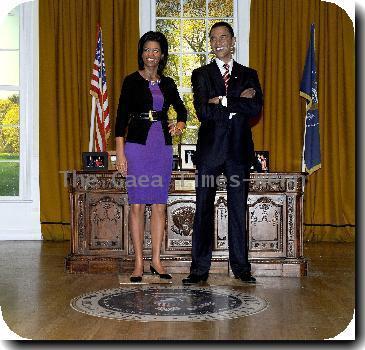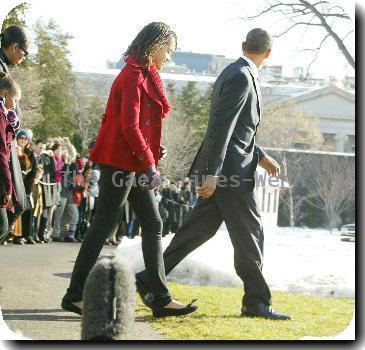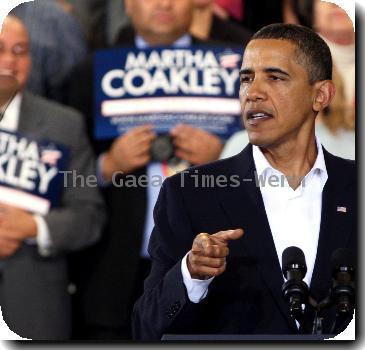Israel approves new building in east Jerusalem, risking another crisis with Washington
By Aron Heller, APWednesday, March 24, 2010
Israel approves new building in east Jerusalem
JERUSALEM — The Jerusalem municipality has approved 20 new apartments for Jews in an Arab neighborhood of east Jerusalem, the city said Wednesday, in a move that could stir a new diplomatic crisis with the United States just as Israel’s leader is in Washington on a fence-mending visit.
The announcement marked the second time this month that Israel has announced new construction in the disputed section of the holy city during face-to-face meetings between top U.S. and Israeli officials.
The Obama administration is seeking “clarification” of the latest building plan and continues to believe Israeli construction in Jerusalem is destructive to the Mideast peace process, said White House spokesman Tommy Vietor.
Israeli lawmaker Eitan Cabel accused Prime Minister Benjamin Netanyahu of unnecessarily provoking the U.S.
“Is this another ‘unfortunate’ mistake? Is this another ‘misunderstanding?’” said Cabel, a member of the Labor Party, which sits in the governing coalition.
“Netanyahu decided to spit into Obama’s eye, this time from up close. He and his pyromaniac ministers insist on setting the Middle East ablaze.”
On Wednesday evening, Israel’s Channel 10 TV reported that an additional 200 apartments were approved last month for private land near the first 20. A Jerusalem official said the proposal was brought to one of the planning bodies by a private group, but not to the city, which would have to approve it. The official spoke on condition of anonymity because no decision has been made.
The U.S. views Israeli building in east Jerusalem, the part of the city claimed by Palestinians as their future capital, as disruptive to Mideast peacemaking. Israel, which captured east Jerusalem in the 1967 Mideast war, insists the city cannot be divided and says it has the right to build anywhere.
These differences erupted into a crisis earlier this month when Israel announced during a visit by Vice President Joe Biden that it plans to build 1,600 new apartments for Jews in east Jerusalem.
Israel has apologized for the poor timing of the announcement but rejected calls to cancel the project. In Washington this week, Netanyahu reiterated his tough stance, telling a pro-Israel audience that Israel was determined to keep building in all of Jerusalem. The statement was quickly rejected by the U.S.
Netanyahu met with President Barack Obama on Tuesday in an attempt to defuse what has become the countries’ worst spat in decades. But the latest announcement, confirmed Wednesday, by Jerusalem city officials threatened to derail any progress. In Washington, Netanyahu spokesman Mark Regev had no comment on the approval for the new building project.
Netanyahu’s talks with Obama administration officials were scheduled in continue Wednesday.
The new project threatens to be even more contentious than the earlier one because it is located in Sheikh Jarrah — an Arab neighborhood in the heart of east Jerusalem. Past efforts to move Jewish residents into Arab neighborhoods have often led to protests and even violence.
The project — funded by Jewish American millionaire Irving Moskowitz, a longtime patron of Jewish settler groups — calls for tearing down part of an old hotel, the Shepherd, and building 20 apartments and a three-level underground parking lot instead.
Word of the approval was leaked to an Israeli Web site minutes before Netanyahu met with Obama at the White House on Tuesday.
Netanyahu, who has demanded that he be personally informed about any east Jerusalem construction projects before they are approved, was caught off guard by the announcement, according to a top aide, speaking on condition of anonymity because he was not authorized to discuss the matter with the press.
It was unclear whether the issue came up in the White House meetings.
Peace Now, an Israeli anti-settlement watchdog, discovered the latest building plan.
“It seems that the municipality of Jerusalem has it own policy that might be devastating for the peace process and Netanyahu wasn’t clear enough in order to stop them from allowing further provocation in east Jerusalem,” said Peace Now spokeswoman Hagit Ofran.
Jerusalem city officials have tried to play down the project as a zoning issue.
Mayor Nir Barkat says he is committed to bettering the city for all residents, but vociferously opposes the notion of sharing sovereignty over the city. He has repeatedly said he will continue to promote housing construction in all parts of the city.
City spokesman Gidi Schmerling said the project was approved last July, and the recent approval was merely a procedural step after developers paid a final fee for some paperwork. He said media reports were blowing the matter out of proportion, saying they were “meant to create a provocation during the prime minister’s visit in the U.S.”
Netanyahu aide Nir Hefez said in a statement that there are no limits to Jerusalem real-estate deals. “Jews and Arabs can freely buy private properties in all parts of Jerusalem, and they do,” he said, adding that approval of the Shepherd Hotel project came last year, and there was nothing new now.
At the time of the approval last July, the U.S. demanded that Israel suspend the project and even summoned Israel’s ambassador to Washington over the issue.
Palestinian negotiator Saeb Erekat condemned the plan, and said it damaged Israel’s credibility as a peace partner.
“There is growing international frustration with Israel over the actions and decisions it is taking,” Erekat said. “Israel is digging itself into a hole that it will have to climb out of if it is serious about peace. There is overwhelming international consensus on the illegality of Israel’s settlements, including in east Jerusalem, and the damage they are doing to the two-state solution.”
Israel annexed east Jerusalem after capturing it in the 1967 Mideast war, but the move was never recognized internationally. The international community sees Jewish neighborhoods in east Jerusalem as no different from settlements in the West Bank.
Nearly 300,000 Israelis live in West Bank settlements, in addition to about 180,000 Israelis living in Jewish neighborhoods in east Jerusalem.
Tags: Barack Obama, District Of Columbia, Israel, Jerusalem, Middle East, Municipal Governments, North America, Palestinian Territories, Territorial Disputes, United States, West Bank









